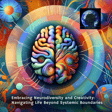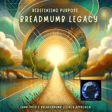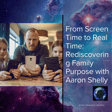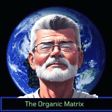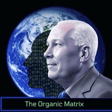Become a Creator today!Start creating today - Share your story with the world!
Start for free
00:00:00
00:00:01

How Can Empaths Manage Overwhelm and Set Boundaries?
In this insightful episode, we dive deep into the world of empaths and highly sensitive people with our special guest, Jennifer Moore. Jennifer, an expert in empathic sensitivity, shares her personal journey and offers valuable strategies for managing emotional overwhelm and setting healthy boundaries. Whether you're an empath struggling to cope with the chaos of daily life or seeking ways to turn your sensitivity into a superpower, this episode is packed with practical tips and empowering insights.
Jennifer discusses:
- Her unique methods of handling demand avoidance and task overwhelm.
- The intersection of neurodiversity and empathic sensitivity.
- Techniques for managing physical and emotional clutter.
- The importance of processing existing abundance to welcome more into your life.
Join us as we explore how to thrive as an empath and protect your energy in a world that often feels overwhelming.
Connect with Jennifer Moore:
- Website: Empathic Sensitivity (Get your free Empathic Safety Guide: 3 Basics For Finding Calm In the Eye of the Storm)
- Facebook: Empathic Mastery
- YouTube: Empathic Mastery with Jennifer Moore
- Instagram: @empathicmastery
- TikTok: @empathicmastery
Transcript
Introduction to Empath Challenges
00:00:00
Speaker
Welcome to the organic matrix, the life guide in your pocket. Are you an empath who often finds yourself overwhelmed by emotions and energies around you? Do you struggle with setting boundaries and protecting your own energy? If so, you're not alone. Many highly sensitive individuals face these challenges on a daily basis and it can be a constant struggle to navigate the storm of empathic overwhelm.
Meet Jennifer Moore
00:00:24
Speaker
But fear not, because in today's episode of The Organic Matrix, we will dive deep into the topic of managing empathic, overwhelm, and establishing boundaries with our special guest, Jennifer Moore. She is a renowned expert in supporting intuitives, lightworkers, and creatives on their journey to harness their abilities for good.
00:00:45
Speaker
As you journey through the Matrix, this information will serve you as a guiding light, empowering you to take control of your empathic abilities and find strength within your sensitivity.
Empathy as Strength
00:00:56
Speaker
Jennifer's insights and practical strategies will help you embrace your empathic nature as a superpower rather than a curse, allowing you to thrive in the world that often feels overwhelming. So bookmark this episode and keep it close for these moments where you need support in managing Empathic Overwhelm and establishing boundaries. It's time to reclaim your power and navigate the storm with confidence and grace. Looking for career advice, personal development tips, or inspiring stories? Our Matrix Mentors has you covered. Don't miss out. Bookmark our podcast and follow us on social media for a life guide in your pocket.
00:01:34
Speaker
Jennifer, it's an honor to have you on the show today. Oh, Samantha, I am so excited to be here. Thank you so much for inviting me. It really is a pleasure. It's an honor.
Childhood Sensitivity and Struggles
00:01:47
Speaker
Can you tell us a little bit about your journey and how you found your way of serving people today? Um, so like so many, absolutely. Let me see if I can try to make a very long story short here. I mean, I was born, I was personally born in the early sixties and at a time where nobody was talking about this stuff. And so I was very frequently told that I was being too sensitive, that I was overreacting, that I was taking things too personally. And the kids knew I was weird. Like they knew that there was something different about me. And
00:02:23
Speaker
you know I really and I kind of knew I was different too but I didn't really necessarily have the words for it and I had a family who were very sort of scientifically oriented and very like there's got to be a reason for this or or like that's not real that's just your overactive imagination and so I I really struggled with feeling a lot of intense emotions that didn't correlate with my life that didn't necessarily make sense a lot of the time. And so I struggled with what I thought was at the time like depressed by the time I was like in my
00:03:01
Speaker
early teens. And especially once I was in my mid teens, I thought I perceived myself as struggling with depression. I perceived myself as struggling with anxiety.
Overcoming Depression and Anxiety
00:03:10
Speaker
I was going down the route of psychopharmacology as well as self-soothing with sugar. and and cigarettes at that point in time and just trying to find answers. And the thing was that for me, I know what it's like to struggle and feel like something's wrong and something's broken and just it's not working. And I also know what it's like to get relief. And so as a result, pretty much from the time I've been in my early 20s onward, my I've been as as it committed to the path of recovery for myself and for sharing the tools that work for me with other people, because I just know like it's, it Is it okay if I use sort of like semi off-color language here? do was Yeah, i didt believe I was going to say I know how much it sucks to just to really be in that place where you just feel like your life is just spinning out of control. And so if I can help one person feel not have to go through some of the things that I've gone through, then my life will have been worth something.
00:04:31
Speaker
or it will have been, you know, like I will have accomplished my goal. Oh, thank you so much. And thank you for bringing something that you struggled with and turning it into a gift for everybody because growing up, I can relate to your story. Like I was, I'm super sensitive and growing up, I was like, there's no way that nobody's reacting to the things that I'm seeing. like Right. Right. Like do people like walk around pretending like everything's normal? Yeah, I mean, I totally, it's so baffling when you're picking things up and you're seeing things and you're noticing things and you're like, how is it that these people are not as sensitive to this? How is it that these people just don't care? Like it blew me away when I was a kid, even just watching kids just be able to let things roll off their back. Like it just wasn't a big deal. And I was like, but it is a really big deal.
A New Perspective on the World
00:05:26
Speaker
And then when I was um like 18 years old, I had this experience where I kind of had a glimpse at how other people see the world. I had been hanging out with some friends and had gone to, I was sort of doing as an a sleepover at some friend's house and we had been partying all night. And playing with some hallucinogens, which I had a glorious misspent youth, let's just say. I don't recommend it. so Don't try this at home. But we had been partying. And at the end of the night, when every sort of like the other people had gone and it was just me and my friend and her boyfriend,
00:06:10
Speaker
They had turned on the television and they were just watching like this Godzilla versus Gamora, like a bad, badly dubbed Japanese horror movie. And I was sitting in one chair and they were sitting together like on a couch or something like that. And they were watching the TV and they were just laughing at it and finding it kind of funny. And I was like watching the room. I was noticing the fish tank and the little it had one of those like fake diver with the with a treasure chest that opens and closes as like that as the air bubbler and I'm watching the air bubbler and I'm watching the fish and I'm hearing the sounds and I'm watching the television. and I'm watching them watch the television and I'm noticing like the the curviness or the waviness of this old house and the floor and I'm aware of the sounds of the house around me and the feeling of the air on my skin and the color of the light and everything that is going on around me.
00:07:12
Speaker
and I look over at them and they are like tunnel vision just focusing on this one TV show. And that was the moment when I went, oh, I see the world in a different way than these people do. They don't see the things that I see. They're not picking up all of the energy, the thoughts, the feelings, the sensations, the things that are going on in the world around them. They have a capacity to just sort of put on the blinders and kind of compartmentalize and just see the one thing in front of them. And that's the thing I think is empaths and highly sensitive people as well as other kinds of neurospicy people or neurodiverse people.
00:07:59
Speaker
that I think we often imagine that our experience that other people are experiencing it and in a world where so frequently people are always talking about well everybody's an empath or everybody's equal it's really hard because the thing is no everybody is not equal and when we try to lump everybody into the same category The problem is those of us who really are not in that category, who are outliers, end up feeling like, well, there must be something wrong with me. Why can't I fix this? Why can't I do this differently? Why can't I experience the world differently?
Connection Between ADHD, Dyslexia, and Empathy
00:08:34
Speaker
And for me, that experience was one of those those pivotal, like really significant moments, because that was one of the very first times where I kind of went, oh,
00:08:44
Speaker
I think I am experiencing the world in a really different way than other people are. Oh, thank you so much. Your story is so beautiful. And it's when you speak to my soul, I relate to you on so many levels. And yeah, when you mentioned that when we try to lump everyone into one category, it's so true. Like when I was younger, I'm neurodivergent. So I have ADHD and I have dyslexia. And yep.
00:09:14
Speaker
it merged with my empath abilities because I feel like it wasn't like, we literally have different shaped brains. We literally process information different. Like it goes from the right hemisphere to the left instead of the left to the right. And so i would I was put into a special ed class and I'm telling, like I go to school in New York. so public some so A lot of public schools in New York are not very chill. They can be very aggressive, like the students there are rowdy. and so my ah elementary school put me in special ed for like two days and I couldn't learn anything like there's kids fighting different behavioral issues and like all these kids needed different attention so like how exactly
00:09:57
Speaker
Yeah. So they had to take me out of that class and put me in a typical learning environment, which I'm so grateful for because my disability isn't a handicap. It's just something I have to learn how to make my superpower. And that's why I love this empowering notion that you took with being different. It's okay. Let's figure it out. Right. Well, and I will say it was an incredible journey to get to the place where I'm like, it's okay because I, really thought there was something wrong with me and felt like I was the problem. I was too sensitive. I was overreacting. And and I will just say that, yeah, dyslexia and ADHD runs in my family. I think that there's a really interesting interconnection between ADHD being an empath. And the more conversations I've had, the more I'm realizing that many, many, many of us who are empaths are also neurospicy in other ways. And so in my family,
00:10:55
Speaker
Like ADHD is pervasive in my family. Dyslexia runs on both sides of my family. I was really fortunate in the fact that something like my brain clicked over. Like I had a really hard time with reading. I was a horrible speller as a child. And then somewhere around the age of nine, it was like something in my brain clicked and my capacity to read shifted. But I will say that I have a love-hate relationship with writing and but and with reading. like if i'm maxed out If I'm already overwhelmed, the first thing to go is my reading and writing ability. It's like my capacity to process is directly connected to my stress. So when you were talking about the whole system of taking a kid, a girl,
00:11:47
Speaker
with ADHD and dyslexia and throwing her into the behavioral room. It's like it's the worst thing you can possibly do. I was really lucky because I grew up right before the intervention started to happen. Whereas my siblings, my brother, my sister, she got some help. But my brother, because he's the youngest of the three of us, he ended up in special classes. And it was probably the worst thing that could have happened to him. He was extremely smart. He was extremely, he was extremely bright. And he was surrounded by these kids with behavioral issues. I think the fact that we lump
00:12:29
Speaker
kids with brain differences in with kids with behavioral issues. It's like what ad genius came up with this idea, not a smart way to put things together at all because the needs are so completely different. My brother who really struggled with dyslexia. He's at this point, I mean, he's got a, he's, he's a doctor of physical therapy. And he's, in you know, works in the medical industry and is in management and does a lot of really amazing things. But one of the things he had to learn was to advocate for himself. So like, for example, if he's trying to take a test in um a standard environment, he can't do it very well. So he would ask for
00:13:14
Speaker
um you know, a private room where he could go take the test where he wouldn't be distracted by all the noises and the sounds and for there not to be a time limit because of his learning disability and he would be able to do great with it. And so it's sort of funny that you speak about your experience with with being put into these environments where it's really stressful. And of course, you just kind of as an empath just kind of completely imploded. So, I mean, this is a whole conversation and And actually, I've had a couple conversations about eight on my podcast Empathic Mastery Show, I've got two episodes where we talk about ADHD and empaths because of the fact that it does it there's death there definitely seems to be a correlation.
Coping with Overwhelm in ADHD and Empaths
00:13:59
Speaker
And I could go down a whole rabbit hole about there's this gene mutation, the MTHFR gene mutation. And what's really fascinating is that it seems like there are a lot of empaths with this gene mutation, but then there's a lot of tons and tons of people who are on the spectrum between dyslexia, ADHD, autism spectrum, that there are many, many people with this gene mutation who end up
00:14:27
Speaker
somewhere along the spectrum. So I think that there's a direct, there's definitely correlation with like, we are wired differently, we are different. Yes, and I love and i love it now. Thank you so much for bringing up your personal experience with dyslexia and ADHD. I always find it so inspiring when I meet an author who's dyslexic, when I meet a doctor who's dyslexic, just to prove that it's no handicap. like No, we have to learn. you know The thing is that the ordinary solutions don't work for us. And I mean, in some ways, I think that
00:15:05
Speaker
That's one of the biggest discoveries that I've ever had personally regarding being an empath in general is that the ordinary solutions that you can see a normal quote normal person doing a lot of times those don't do the trick. But what it means is that we have to find solutions that work for us, not try to force ourselves to fit into the solutions. so like For example, what I discovered in terms of writing the book was that the way for me to write the book started with teaching. I spoke the book. I had a group of people who wanted to learn the content.
00:15:46
Speaker
I asked people questions, I got what were the questions that were most important to the people who are struggling with their empathic overwhelm, and then I created a curriculum based on the information that I was getting from other people, and then I create it and then i taught the whole thing, recorded the whole thing, transcribed the whole the thing, and basically had the transcriptions as the raw text for the book. Then I kicked it over to a content editor who we had a conversation about like what needs to be in the book how should this flow what's the order of the thing like we discussed the outline we kind of had the vision of where it was going.
00:16:30
Speaker
And actually, as I say that, I realized I actually had a conversation with another person about the flow before I even kicked it over to the content editor. So we knew the direction it was going in. And then that person pulled the chunks, moved them around and sort of fit it together like a puzzle. And then only after it was fit together like a puzzle that made some sense, did I come back to that rough draft and actually go back in and rewrite into it and edit it, add more content, add more personal stories. and i But i had to I had to schedule it, like I had to schedule chunks of time to just get my butt in the chair. I would put on ah like the binaural beats or the solfegeo frequency, like meditation music on YouTube.
00:17:24
Speaker
and have like the drone going in the background. And I also have this frequency generator called a rife machine because of my relationship or history of Lyme disease. So um there are frequencies that you can run that contribute to like focus and brain entrainment. So I'd run frequencies and I would just sit down with like YouTube in front of me, frequencies behind me with my computer and just be like, and I'd write on. I'd go to Facebook and I'd write a thing and I'd tag all of the people who were on my team for the book and I'd be like, okay, wish me luck. I'm going in. And I would basically say, I'm showing up to write. I'm going to do this for the next X amount of time and I'm going to come back and I'm going to report back that I did it. So I was holding myself accountable. I was putting myself out there.
00:18:17
Speaker
and that was how I got the book done. And then I kicked it back over to other people who knew my writing, who knew my voice and who could do really good editing. What I want to say is anybody who thinks that writing is a solo project does not understand the nature of writing. Any good content, any good book that is out there, any really good piece of writing has had an editor. It has been through the hands of more than one person because We can't read the label from the inside of the jar. and And like letting ourselves receive help is such an incredibly, incredibly important part of getting the book out into the world. But I had to, it took me three years. Like there are some people who could write a book in the course of six months.
00:19:04
Speaker
I just had to honor my, not my resistance, but my pacing, like how much time it takes to do things and just respect that it was going to take what it took and that I still had to just keep showing up for it instead of giving up because that's the real thing. I love there's a, I think it was a Banksy image. Um, and I don't know if I'd seen it with a Banksy image. I don't know if it was actually like he wrote it on with the spray paint, but it basically says pause instead of quitting. Like when you hit that wall, hit the pause button, don't hit the stop button. Don't quit. You know, pause and stand that for those of us who are hitting empathic overwhelm, who are hitting
00:19:48
Speaker
and those moments when our bandwidth is maxed out and we just don't have the brain power to process anything any, you know, process anymore. It's like pause, hit the pause button, like allow yourself to reboot, but don't quit. Oh, that's fantastic advice. And I knew it was a divine timing to talk to you today because That's exactly how I felt today. um I felt so overwhelmed. And I was like, you know what? I got respect. And that's the biggest thing, right? like when we're When we're not typical, right we don't fit into the square box. and It's really important to like learn ourselves. And then with that self-discovery, learn to love ourselves, accept ourselves, and like not pressure ourselves. Because I find that in like my personal journey, and I'm sure many Matrix members can relate, is
00:20:41
Speaker
You really want to get something done. You feel yourself getting overwhelmed. You really want to keep working at it. And then we start spiraling into these thoughts like, oh, remember when this person said this or I have this disability? These limiting beliefs start sneaking up when we're overwhelmed because our guard's down. So I love that advice.
Managing Stress and Demand Avoidance
00:21:04
Speaker
Thank you so much. You're so welcome. And I want to say something. I just learned about a trait. and ADHD trait that I didn't even know existed. I'm just pulling out my notebook to just be sure I'm saying the right words for it. But um demand avoidance.
00:21:23
Speaker
I had never heard about this as a term in ADHD until I was talking with one of my mentors like actually yesterday and she's like, Oh yeah, that's demand avoidance. And it's like, it's this idea of when we have, even if we want to do something that with the ADHD, there are these points where if we start feeling too much pressure coming at us, like if there's too much demand for the thing and we feel like, Oh my God, like we have to get it done. then we just like we hit this demand avoidance where we just hit this wall of like I can't possibly do it and it just and so it's sort of the the joke about it is like You know You're already feeling the pressure and then the next thing is like you just plummet you just shut down because of that feeling of of like there's too much demand There's too much stuff coming at me. And one of the things I learned years ago
00:22:19
Speaker
Before I started working on the book and creating the online world that I've created and the courses and the trainings and things, I was working as a professional tattooer, tattooing as a healing art. And I did that for many, many years. And the thing is that there is a point where I'm like thinking about, I've got like all these things to do. I've got to get the drawing done. I'm having a conversation with a client. I've got to get everything set up. I've got to like I'm trying to fuse all these things. The phone is ringing. Other people are running around doing all this stuff. And what I noticed when I was I would hit this place where I would start to feel pressure, like I'd start to feel the sense of like hecticness and like, oh, my God, you better hurry up. You better move faster. You're not moving fast enough. And what I realized and discovered was that any time I started to feel racy or hectic or urgent or like I had to move faster,
00:23:14
Speaker
I would actually shoot myself in the foot if I kept trying to go faster. But if I noticed that I was revving up and instead of trying to push my foot down on the accelerator, I would downshift and I'd actually pull my foot off the accelerator and just be like, okay, slow down, take a chill pill. Let's do this at half speed right now. Let's not try to rush through this. I would inevitably do a better job and I would get more done by moving at half pace than if I tried to double my speed.
00:23:50
Speaker
but Even something like I don't want to do the dishes. It's like if I'm trying to rush through the dishes, not only am I more likely to break a glass or something like that, but I'm going to do a ah mediocre job and I'm probably going to max out midway through. Whereas if I'm just taking that one plate or that one cup at a time and just dealing with things or being like, okay, let's rinse this off, put it in the dishwasher, it gets done. so And I think the thing is that this is one of those places where the intersection between the ah neurodiverse brain and the empath
00:24:30
Speaker
that sense of overwhelm, like when we hit overwhelm, it gets really hard for us to function, whether it is task overwhelm, or like physical clutter overwhelm, or, ah you know, physical sensations in our body overwhelm, or when we are just in that place of like, we're just being bombarded with too much energy, too many thoughts, too many feelings. that quality of overwhelm makes it really hard to make sense of anything and especially to be able to like move forward and like take the next step because we can't even see the next step. We're just like, where am I going? What am I doing? Why am I here? It's so true. I love that you bring case studies, that you like look into these
00:25:25
Speaker
details because when I was growing up, I didn't really understand my disabilities until now. Like now that I'm an adult and I could actually read it and it's the biggest thing. And so most of my life, I don't even remember most of my memories or my times with friends or family because to what you were saying, I was living in a state of overwhelm. I was living in a state of fight or flight. I had so much stress. Like now that I'm more mindful and I'm meditating, like I see myself typing on my computer, working on some work or writing notes in my book and I'm i'm seeing myself clenching. And I'm like, have you ever worried about whether your furry friends are getting the best nutrition possible? As a dedicated pet parent, I've always believed our pets deserve nothing but the best when it comes to their diet.
00:26:12
Speaker
I love my pets and I want to make sure they live long, happy, healthy lives. That's our responsibility as a pet parent. I used to spend hours meal prepping and cooking food for my pets, but num num takes the problem of me hovering over that hot stove away. What sets num num apart is their unwavering commitment to transparency and quality. You can actually see the proteins and vegetables in their meals. Beef, chicken, pork, peas, carrots, kale, it's fresh and you know exactly what your dog is eating.
00:26:47
Speaker
Isn't it time to feel great about what you're feeding your dog? Order num num today. Just head over to the description below and I'll be putting our promo link and guess what? You get 50% off your first order and free shipping. Num num food is packed with fresh proteins your dog will love. Fresh really means fresh with num num. You can see exactly what your dog is eating. No fillers, no weird ingredients, just wholesome delicious meals. Your furry friend deserves the best. And with num num, you can get just that. Let that go. I'm starting to build it up. Well, and even just notice your shoulders, you know, like where and and maybe everybody listening to this right now, like just let's take a moment and just notice like,
00:27:34
Speaker
Actually, before you even notice your shoulders, notice your elbows. Like, where are your elbows? Are your elbows like, you know, and then notice your shoulders. Are they up by your ears? Because one of the things I would always notice, especially when I was tattooing, was I was constantly holding my hands up like this. And I would have my elbows, like, up. And this particular state of being where you're kind of like working at shoulder length to everything is really stressful on the body. and adds the sense of hecticness. And so it's sort of like, okay, are you like let your hands drop, let your elbows drop, let your body drop, let your shoulders drop, allow yourself to sink into gravity. And what a difference that is of like what it feels like to just allow your body to be held and supported and let sort of your shoulders be like down, let your elbows be down.
00:28:31
Speaker
as opposed to that sense of like, I have to hold myself up. And just even that, like just noticing where are your shoulders? Where are your elbows? And just letting them drop. Oh, thank you. That felt like the little meditation that I needed all day. Yeah, yeah. You and me both. I wanted to also ask, when did things start to flip in your life, and noticing that you have different abilities of sensing different energies around
Mastering Empathic Abilities
00:29:05
Speaker
you? When were you able to hone in on your unique qualities and start stepping into your power with them to help others?
00:29:12
Speaker
So for me, this was really incremental, you know, I know that there are some people who have sort of like a aha moment and a really pivotal moment. But for me, it was kind of incremental. And it's sort of been a I mean, I had a prophetic dream when I was nine, where I dreamed I had this dream, this vivid dream that my mom had died. And it turned out that that was the night that my very first BFF mom had died. And so and the thing was it was interesting is that my definition of empath is an empath is a being a sort of backpedaling here But an empath is a being who picks up the thoughts feelings energy and sensations From the world and it could be the world right around them. It could be the across the planet It could sometimes be even galactic like there's like people who are so sensitive. They're picking up stuff outside of this realm and outside of this dimension and
00:30:05
Speaker
But that, you know, and the thing about about an empath picking up the thoughts, feelings, energy and sensations is that unlike a psychic, you know, an intuitive a psychic or a medium, who know they're picking up information coming from outside, empaths process information as if it's their own. And, you know, so like, for example, an intuitive or a psychic would walk into a house where maybe there'd been like a dad, or a fight or something, and they would be like, wow, it feels really sad in here or feels really angry in here. Like I really get the sense of like, oh, it seems like somebody might've died in here. The empath walks into the same space and goes, why do I suddenly feel so sad? Why do I suddenly feel so angry? So interestingly, my dream, the way an empath process the information, because instead of dreaming about her mom and her experience, I dreamed it was my mom and my experience. And I had the worst day of my nine-year-old life, like I was just beside myself. But I somehow, when my mom said, oh so-and-so's mom died of breast cancer last night, I put two and two together. I went, ah.
00:31:13
Speaker
I dreamed about this and this is what happened. So by the age of nine, I was already aware that I had extra sensory perception. So I was starting to look for books. I was starting to look for information. And I just wanted to learn everything I could. By the time I was about 18 and a half, 19, I picked up my very first tarot deck and I took to it like a duck to water. I understood it. like I took a class with somebody who was teaching it and I was like the first class I'm understanding the decks more than he is and I'm sharing like and I'm like and this and this and this like the kid I was like oh my god I know more about the deck like I'd only been reading for about three weeks and I knew more about tarot than this kid did. I understood it completely
00:32:03
Speaker
And so I started reading tarot cards. I started doing psychic work. I started telling people things that would happen. I started just being able to be like, yeah, watch out, you want to be using birth control, you're going to get pregnant. Three weeks later, they'd be like, ah you were right, I'm pregnant now. There was this stuff that would happen. But what happened for me with that was that I started to have my personal recovery journey around sugar addiction and cigarettes started to happen around the same time that I was really starting to develop my psychic abilities. And so as I started to look at what was making me use sugar, what was making me use cigarettes, why was I turning to these things for self-soothing, and I started to look at my own journey in recovery,
00:32:50
Speaker
I was also doing work with other people and so I started to, as I started to become more savvy to my own wounds, what I started to realize was that instead of just reading tarot cards and there's this woman Thalassa from San Francisco who's a tarot, one of the OG tarot people, And Thalassa used to say, or maybe she still does, I haven't seen Thalassa in years, but she would say, ah, I see, you know, you know, it's like, you will meet the tall, dark cesspool and fall in. And, you know, the thing is, like, that's old school fortune telling is like, you're gonna this is going to happen to you. This is what you're going to experience. And I started to be like, I started to realize it wasn't helpful for people to know what was just going to happen to them. It wasn't helpful.
00:33:38
Speaker
to just have the, you know, to just have a, this is, this is your fate. This is your destiny. I started to become a lot more curious about the why. And I started to become a lot more curious about the, you know, how do we address and deal with this and shift it. So instead of it being, you're going to meet a tall dark cesspool and fall in, I started to look more at, okay, so what is it about tall dark cesspools that make it are so appealing to you? And why do you keep being attracted to them? Why are you falling into them? And so then from that question, I started to be like, okay, reading is great.
00:34:17
Speaker
but but it's not a tool for clearing the trauma and the memories and the history and the stuff that's getting us stuck. And so that's when I started to be like, I need to learn how to use tools to help other people to make these shifts. So one of the very first tools I learned was breath work, using breathing techniques and using conscious deliberate breathing to move the energy in the body and to shift places that have been stuck where we have trapped emotions. From breath work I then went into Reiki because and and just my guides my spirits you know spirit would be like you got to do this you got to teach a tarot class you got to do this you got to do this so I went from breath work like actually I went from tarot teaching tarot and reading tarot to learning how to do breath work to becoming a Reiki master to
00:35:13
Speaker
deciding to go to seminary because, ah you know, I was not, I just, I wasn't able to get things to quite click or work. Like my business was like, I knew I was good at what I was doing, but I was also in my late twenties, early thirties and didn't quite have the chops yet. And, and like, didn't really understand how to run a business. So I decided to go to graduate school and got a master's degree in psychology and religion. But at the same time that I was doing that, I was also doing a two a year year like a 13 month training with um this wonderful woman Sylvia Braille and Sylvia was or Braille or some people call her but Sylvia Sylvia had at the time this thing called the School for Body Centered Spiritual Healing. So I did a 13 month program with her
00:36:02
Speaker
learning about shamanic healing techniques while I was in graduate school, while I was in seminary. And ironically, I got out of seminary, ah got my master's degree, got ordained as a minister, ironically, with Sylvia. I spent three years in graduate school and it took five minutes to become an ordained minister through Universal Life Church, but became a minister at all times. all this training all these credentials and spirit was like you're going to become a tattooer and so I sort of pivoted in this direction and started to integrate all of the skills and the tools that I had had my training undergraduate training as an artist my
00:36:48
Speaker
Training as a Reiki practitioner, as a breath worker, my training in pastoral counseling and care and supporting other people. And so I took all of these pieces and then sort of did, spent 20 years putting prayers on people's skin and helping their truth and beauty to surface and working with people to just draw out their truth. But also I learned a lot about how to sit with and hold space for pain without taking it on or feeling like it was my like feeling like it was my job to make it better or rescue people. And
00:37:24
Speaker
While I was training as a tattooer, I continued to like I would get these prompts. So I ended up doing a two year long shamanic apprenticeship program with some other shamanic practitioners to learn how to do like soul retrieval and those kinds of more advanced techniques. And as well as I discovered EFT, And I was like, I have to learn how to do this, which that was the big life change. Like that was the thing that allowed me to completely pivot and leave. Like, I mean, we're talking like a thriving, thriving business where I was booked out six to eight months in advance. And where Spirit was like, yep, you're coming to an end with this. This is like you've been doing it and for like 20 plus years, it's time for you to walk away from this now.
00:38:13
Speaker
and You know, EFT was one of the tools, like it was one of the things that allowed me to get out of my own way. And in case your people are not aware, EFT, also known as tapping, stands for emotional freedom techniques. And it's, yeah, the tapping. And it's where we basically apply light pressure or tap on acupuncture points. And it's kind of like a mental, emotional, and spiritual acupressure or acupuncture without the needles. So that, you know, so I went there. So like, as I said, for me, the journey has been this incremental journey of I have a revelation, I have an experience, I get relief myself. I go, Oh my God, I want to share this with other people. Like most of the time I experienced something, it works for me. I just want to spread the good news. I want people to know like how, because I know
00:39:09
Speaker
how much it sucks to be stuck I know how hard it is to be in that place where you're just feeling like I don't even know I don't have any answers I'm not really sure what's gonna happen next I hope I don't die like And so that's that's a lot of what has motivated me. But anybody, you know, I would just want to say that I think that unfortunately, with the onset or with the the excessive amount of social media we have and the excessive amount of like just like talking heads who claim to be experts and claim to know what the what they're doing and all of this just like the curated lives that we see.
00:39:53
Speaker
on social media all the time, I think people will get a very unrealistic perspective about how much time it takes to get to the places we need to get and to be where we need to be. Because there are a lot of people who never ever put on their training wheels who are claiming to be like master bike riders. and like a lot of people who will put their shingle up with six months of experience because and where they're like hey look at me I'm a total success and like some people you'll hear like you know yeah it was my first launch and I made thirty thousand dollars or I made fifty thousand dollars and I made a hundred and twenty thousand dollars with this first launch
00:40:40
Speaker
That, in my experience, is the exception, not the rule. But many people, when things are taking longer than they imagine it will, I think so frequently they think, what's wrong with me? Why is this taking me so much time? Why is this so much harder? It looks like it's really easy for those people. And what I would say is, maybe there are some people who where their mileage may vary. Maybe, you know, certainly you get these people who do like a cute kitty video, and their YouTube blows up and everything goes viral. But and in most cases, it is a slow and steady wins the race. And it's very much this incremental
Growth Timelines
00:41:19
Speaker
process. So I just really wanted to say that about just like the journey to come to these places. It's like, we discover something,
00:41:28
Speaker
We work with it we integrate it then we come up to the next level in the next level like it is the journey is not like a you just walk through a door and your whole life is different in my experience most of the time the journey is more like a staircase where it's like you take one step and and you might hang out on that stair or that floor for quite a while and then you move to the next floor and you move to the next floor and you move to the next floor and you know who i am today i'm imagining if we talk five years from now i will probably have have incorporated new things i will probably learned new stuff i'll probably have had more epiphanies i probably will understand
00:42:09
Speaker
even more like what it means to be highly sensitive and empathic as well as neurospicy dealing with ADHD. So I just really, you know, talking about the fact that it's incremental feels really important to me. Oh, thank you so much. And it very much is and and you testified on social media and like you gave me an epiphany when you mentioned it because when we we look at these people who are exhibiting a lifestyle that many people think they want, right, but the things that we think that we want isn't coming from us it coming from comparison from outside of us so we, there's so much more to life when we start looking inside of our own desires.
00:42:55
Speaker
what what where do we feel joy When I meditate, I'm doing this book called The Master Key System by Charles Apanel. And um I'm up to this part where I have to meditate and think about positive associations and recreate the friends, the building, the experience. And as I meditate, I'm struggling to finish this week of training because I'm struggling to stay focused on one association. But if I were to be frank, my but most positive dis association is spending late nights outside with my dogs and my boyfriend doing what I do every single day.
00:43:27
Speaker
It's not being on a yacht at a beach with all my friends or going to Dominican Republic or it's not that. And so I love that you mentioned that because, you know, I, I honor and love the people who talk about the work is hard. Like Tony Robbins, he talks about how he was my age, like 26, 28, and he, he hit success with his life coaching, but he found himself tall. chubby, unhappy, burnt out, and cranky. sony robbs yeah Tony Robbins. And he had to like dial it back and learn how what is adequate self-care? What does yeah my success look like? What does that feel like? Because it wasn't what he thought it was. Right. And what do I really want?
00:44:16
Speaker
We spend so much time projecting into this idea of what we think we should want that we don't always give ourselves permission to admit what we actually want. And a lot of times that can be, you know, there's this aspect of, in EFT, there's a term called secondary gain, like the idea of, ah you're saying you want something on one level, but then there's another part of you that wants something different. An example would be, ah somebody has a health issue, and they're saying they want to feel better. But the thing is, maybe they have a mom who never acknowledged them or took care of them as a little kid. And all of a sudden, they're getting the attention that they never got. It's sort of like if this, so, so the need to feel healthy is actually less, has less straught strength the need to be nurtured.
00:45:12
Speaker
And so as long as we're up against the parts of us that are needing something, we're going to go for the real need, even if we consciously are thinking, I want to make six figures, or I want to have extra number, you know, and for empaths, this is something that comes up so often. If we do not, if we are not dealing with our professional and personal and energetic boundaries, and we are doing what is classic light worker, empath, people pleaser stuff, which is that we are over giving, we are over delivering, we are constantly giving, giving, giving, giving, giving, and we are absorbing and taking on the pain and the struggles of our clients.
00:45:54
Speaker
Even if we're saying I want more clients, the truth is if if we are getting overwhelmed by the three clients we're working with in a week, I guarantee you, you're not going to attract more clients. Period. Like boom, mic drop. And that's the thing. It's like it does not matter how many affirmations you say. It does not matter how many B&Is you go to. It does not matter how many like shaking the tree and making the phone calls. I guarantee you, even if you get another client in, you are going to sabotage it. Something is going to happen. Maybe that client will show up and then another one will drop because we have an energetic capacity for certain things. And if we are maxing ourselves out because our boundaries aren't in place,
00:46:45
Speaker
then we will not be able to grow. we just like it just Even if we say we want this, we will not be able to grow. And um yeah, I could tell you this whole story about cucumber, which you may have seen because I had talked about it on TikTok. and a little while ago, but like where sometimes we got to look at whether we have the capacity to process more before we ask for more. That's like the simplest way to explain it. Absolutely. And and something that I'm learning not studying with my spirituality is there's this saying that they say, ah God doesn't give you what you can't handle. And then to build on that, um Charles F. Pinell says,
00:47:33
Speaker
that end on Napoleon Hill, our abundance matches our capacity of care, maintenance, and responsibility. So exactly, <unk> it's true, ah if we want to pursue six-figure life, we have to be in a position where we can do six-figure work. yeah And you also have to be prepared for the consequences of a six-figure or a seven-figure life. I mean, one of my coaches, she just, and mentors, she just received a 70,000 pound tax bill because of her business. She wasn't quite expecting it to be quite so high, but they went to the accountant and the accountant is like, yeah, you've got a 70,000 pound personal tax bill that you guys owe the feds. You know, she's in the UK.
00:48:19
Speaker
but That's part of, if you are not ready to pay the tax bill, if you're going to get emotionally bejiggity about the fact that you've got to pay a 70 pound tax bill, then you're not ready for that abundance. Because that tax bill is part of the abundance. And I think that's the thing. It's like there are things that we have to be energetically in alignment with all of it, not just the ooh, millions of dollars dropping into my bank account.
00:48:50
Speaker
but like I mean I have I've been realizing like if you like if you look around your house if you look around your you know or your home your space wherever you are and you look in your kitchen you know look look in your kitchen look on your desk look at your purse hey are you Look in your laundry baskets. is everything like Does everything have a place? Is everything put away? Is everything where it needs to be? Or do you have baskets of stuff or boxes of stuff where you're just like, I know the thing is in there, but I'm going to have to go through it. The thing is that if we talk about abundance and we kind of have this idea that abundance is all like positive.
00:49:32
Speaker
But abundance is abundance is abundance. Abundance of, like I've got an abundance of laundry upstairs right now that is not folded but is clean. I need to process that abundance before I can allow in more abundance. And I think that we often have this fantasy or this look at abundance of like, ah, andm I'm attracting or I'm ready for more abundance. It's like, are you really? Or do you have piles of laundry? Do you have dishes in the sink? Do you have all of these things? Do you have all this food?
00:50:08
Speaker
like Are you actually processing the abundance that is in your life or are you believing are you literally letting greens rot in your refrigerator? Oh my gosh. For that was revelatory because I'm like, oh, until I process what I already have, I have no right. attract to be calling in more stuff. I would just get completely overwhelmed. You know, the cucumber story is about back in 2021, I planted, I planted cucumbers and I had this insane, like just the cucumber. They were, I discovered like, there's a whole bunch of lessons to the cucumber story. But part of it was that like,
00:51:00
Speaker
I planted, I didn't over plant. There was plenty of room and the cucumber plants just flourished and thrived. And so we had like cucumbers coming in every single, like we'd have multiple cucumbers every single week for the whole summer. Then at the end of the summer, I got this massive pile of cucumbers. Like I had like this big, big, big, like big tray just covered with cucumbers. And if you've ever made pickles, you understand that when it comes to making pickles, you have to process them immediately or they just won't be very good. So I've got all these cucumbers and I'm suddenly scrambling because I'm like, oh my God, I have to sterilize all the jars. Oh my God, I have to get all these spices together. Oh my God, I have to cut up all these cucumbers. I have to do all this stuff. And what I realized was that
00:51:45
Speaker
When it comes to life, you can have this abundant crop of cucumbers. But if you're not ready to process those cucumbers, there it doesn't matter. it's And I ended up with like an insane, I think I ended up with something like somewhere around between 12 and 14 quarts of of like these like sweet and sour pickles. like It was just crazy. but But it was such a powerful lesson for me because it was like, if you're not ready to deal with the cucumbers, then that's where the problem is. And the thing is, when we're not ready to deal with the cucumbers, we will sabotage, we'll block, we'll stop.
Cucumber Story: Handling Abundance
00:52:32
Speaker
And so part of me is like, fold your laundry, deal with your dishes, eat the food that's in your refrigerator, and then ask for more.
00:52:41
Speaker
Because it's sort of like, my spirit guides would often, for 30 years, now it's probably more like 40 years, they would say to me every time I'd ask, and they would have already given me a piece of instruction, like right now they're just like, fold your frickin' laundry, Jennifer. Like, you know, like, they're like, fold your frickin' laundry. But when I would ask after they'd give me that kind of single incremental assignment, they would, I would ask like, what else, what else, what do I need? And they would always say, do what is before you, and the rest will be revealed. Like do what is before you and the rest will be revealed. We jump the gun as human beings so often. We're fantasizing about the future instead of just being with what we have now. And the thing is, if we cannot process and appreciate and be in a state of abundance with what we have now,
00:53:30
Speaker
I guarantee you, even if you had like multi-seven figures, if you're not able to appreciate the level of abundance that you have currently, you will not be able to appreciate the level of abundance that even at a substantially higher amount. You'll just be way more overwhelmed. Oh my gosh, thank you so much. Oh, that resonated with me so much. And I love that you brought up spirit guides because while you were saying that, I was like, you're speaking for every person's higher self right now. like We all share the same higher self in the sense of the Holy Spirit. Yes, exactly. It was speaking through you right now. It's so true. It's so true. We have to take care of ourselves. we In your right, we get so
00:54:16
Speaker
up i know What I noticed about self-actualization, Maslow's hierarchy of needs, like we work on our stability, we work on social acceptance, we work on, et cetera, et cetera, and we get to self-actualization. What I noticed when I get to that part of my life is when I'm so driven to get the dopamine from creative tasks that I forget to take care of my body. I'll neglect my feeding schedule and neglect my sleep. And then what's left? Do you forget to pee? Do you ever do that? Yes, I do. And I'll stand here like, and it starts hurting. Yeah. Or I'll forget I'm cold too. Like I'll get so distracted. Like I just I forget my bodily I just forget my bodily needs. Now i find myself going down the spiral having to work from the bottom up like okay,
00:55:07
Speaker
What are my survival needs because they're not met right now and then the anxiety comes and it's hard to manage. So I love that. like Take care of what's in front of you, what's behind you, and you'll get to what's in front of you like when in the future after we like show the universe that we have the capacity to be responsible for it. I love that. Yes, yes.
Foundations of Empathic Mastery
00:55:30
Speaker
Well, and as empaths, you know I think that even the whole thing of like where are we ignoring our own body's needs? Where are we ignoring that we need to use the bathroom? Where are we ignoring?
00:55:40
Speaker
that we you know that we're cold, where are we ignoring that we're hungry? And if we are denying those fundamental needs, then it's going to make it really, really hard for us to get more accurate divine downloads and guidance because we are pushing away the crucial, the fundamental foundational self-care information. And it's so incredibly important, I think, for us to start by just listening to our body and honoring the bottom line basics
00:56:19
Speaker
and honoring that still, you know, sometimes that not so still voice inside of us and respecting those needs. Like there's a direct connection between that and empathic mastery and managing our empathic abilities. It's like if we cannot honor just the need to go to the bathroom or the need to eat some food or the need to get sleep or the need to be warm or cool, then all bets are off when it comes to the empathic overwhelm. And a lot of times also, if we're not taking care of the physical needs, we are way more vulnerable and susceptible to picking up the energy, the thoughts, the feelings, the sensations coming from the world around us. Absolutely. So I didn't even need to use my script, but I would love to ask you those questions. Can we do a second episode? I would love to. That would be so wonderful.
Closing and Follow-Up Announcement
00:57:15
Speaker
Absolutely. Awesome.
00:57:18
Speaker
So matrix members, we're going to have a part two to this conversation with Jennifer. It's been completely electrifying and enlightening for me so far. And I know that you guys are taking the same value. So matrix members, I love you. Stay on this note. Let's i'll focus on using that meditation technique that Jennifer gave us. Take the point of your day till next week's episode to look at your shoulders feel your shoulders are they high look at your elbows are they at a 90 degree angle are they above your shoulders like let's just take conscious moments throughout the day to but relax and let it be and do your laundry and do your laundry fold your laundry put it away would you like to give a message to the listeners till next week
00:58:16
Speaker
I just want to say you are perfect exactly as you are. it You were born this way for a reason and you're good. You are good. You are worthy. You you are worthy. Thank you so much Matrix Mentors. You take care of yourself and we'll be seeing you on the next download.






